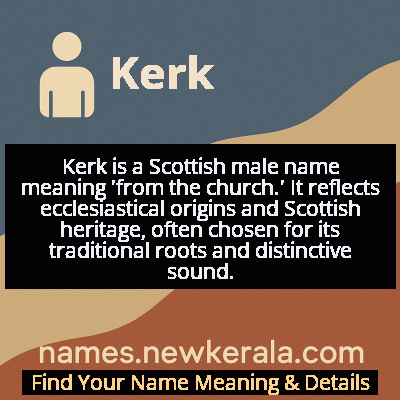Kerk Name Meaning & Details
Origin, Popularity, Numerology Analysis & Name Meaning of Kerk
Discover the origin, meaning, and cultural significance of the name KERK. Delve into its historical roots and explore the lasting impact it has had on communities and traditions.
Name
Kerk
Gender
Male
Origin
Scottish
Lucky Number
9
Meaning of the Name - Kerk
Kerk is a Scottish male name meaning 'from the church.' It reflects ecclesiastical origins and Scottish heritage, often chosen for its traditional roots and distinctive sound.
Kerk - Complete Numerology Analysis
Your Numerology Number
Based on Pythagorean Numerology System
Ruling Planet
Mars
Positive Nature
Generous, passionate, energetic, and humanitarian.
Negative Traits
Impulsive, impatient, moody, and can be overly emotional.
Lucky Colours
Red, maroon, scarlet.
Lucky Days
Tuesday.
Lucky Stones
Red coral, garnet.
Harmony Numbers
1, 2, 3, 6.
Best Suited Professions
Military, sports, philanthropy, leadership roles.
What People Like About You
Courage, energy, leadership, generosity.
Famous People Named Kerk
Kerk Phillips
Economist
Professor of Economics at Brigham Young University and economic policy researcher
Kerk Murray
Musician
American singer-songwriter and guitarist known for folk and Americana music
Kerk Fisher
Business Executive
Technology executive and entrepreneur in the software industry
Name Variations & International Equivalents
Click on blue names to explore their detailed meanings. Gray names with will be available soon.
Cultural & Historical Significance
During the Scottish Reformation and subsequent religious movements, the name maintained its relevance as families continued to value its religious connotations. In the Scottish diaspora, particularly in North America and Australia, the name Kerk served as an important marker of Scottish identity and heritage. Families emigrating from Scotland often preserved the name as a connection to their homeland and religious traditions. The name's evolution from surname to given name reflects broader naming trends in Scottish culture, where occupational and locational surnames frequently became first names as families sought to maintain ancestral connections in new environments.
Extended Personality Analysis
Individuals named Kerk are often perceived as grounded, reliable, and community-oriented, reflecting the name's ecclesiastical origins. They typically exhibit strong leadership qualities combined with a sense of responsibility toward others, much like the central role a church plays in community life. Many Kerks demonstrate practical wisdom, good judgment, and a stabilizing presence in challenging situations. Their personality often blends traditional values with progressive thinking, creating individuals who respect heritage while embracing innovation. Kerks tend to be excellent organizers and natural mediators, capable of bringing people together and fostering harmony in group settings.
Beyond their organizational capabilities, Kerks often possess a deep sense of integrity and moral conviction that guides their decisions and actions. They're frequently described as having old souls—individuals who seem wise beyond their years and who approach life with thoughtful consideration. While they can be reserved in unfamiliar situations, they open up in trusted company, revealing warm, compassionate natures. Their combination of practicality and principle makes them particularly effective in roles requiring both emotional intelligence and decisive action. Friends and colleagues often describe Kerks as the 'rock' in their relationships—dependable, consistent, and fundamentally good-hearted individuals who provide stability and guidance to those around them.
Modern Usage & Popularity
In contemporary times, Kerk remains a relatively uncommon but distinctive given name, primarily used in Scottish communities and among families with Scottish heritage. While it never reached the popularity of its variant 'Kirk,' Kerk maintains a steady, if modest, usage particularly in Scotland and parts of the United States with strong Scottish diaspora communities. The name has seen a slight resurgence in recent years as parents seek unique yet traditional names with cultural significance. Modern usage often reflects a desire to honor Scottish ancestry while choosing a name that stands out from more common choices. It's particularly favored by families valuing both heritage and individuality, and while it doesn't appear on most popular baby name lists, its consistent usage ensures it remains a recognizable, if uncommon, choice for boys.
Symbolic & Spiritual Meanings
Symbolically, Kerk represents sanctuary, community, and spiritual foundation, drawing directly from its meaning 'from the church.' The name evokes images of stability, tradition, and moral guidance, much like the religious institutions it references. Metaphorically, it suggests someone who serves as a cornerstone in their community or family—a person others turn to for wisdom and support. The name carries connotations of gathering places and sacred spaces, implying an individual who creates environments of safety and belonging. It also symbolizes the bridge between earthly concerns and higher principles, representing balanced individuals who navigate practical matters while maintaining ethical standards. In a broader sense, Kerk embodies the idea of legacy and continuity, connecting present generations to historical traditions and communal values that have endured through centuries.

